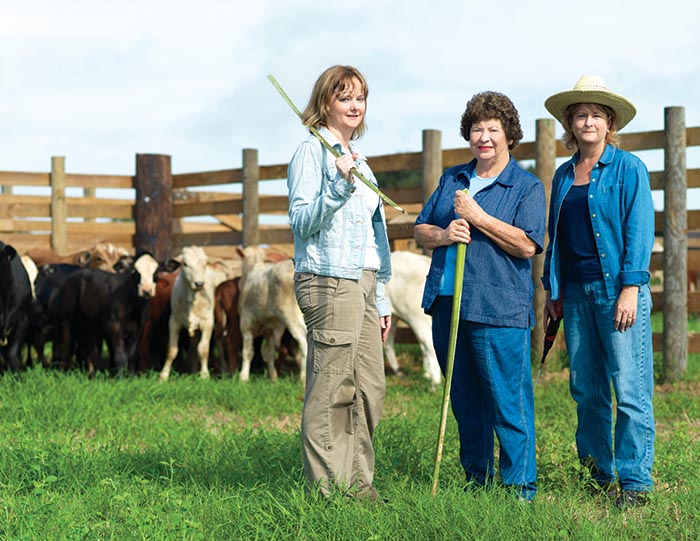
Part 4 in a Series of 4 on Florida’s Cattle Ranching Heritage
Some of the Bay area’s most prominent families had their start in cattle ranching. Though Florida may be known for its beaches, orange groves and theme parks, the state once went neck and neck with Texas in cattle production. Today, more than 15,000 ranches still call the Sunshine State home.
In the fourth of blu’s four-part series, we visit Mabry Carlton Ranch in Sarasota, where three of the strongest women in ranching—a grandmother of five and her two daughters, one a state senator and the other a county judge—manage more than 17,000 acres of ranchland and 200 acres of citrus.
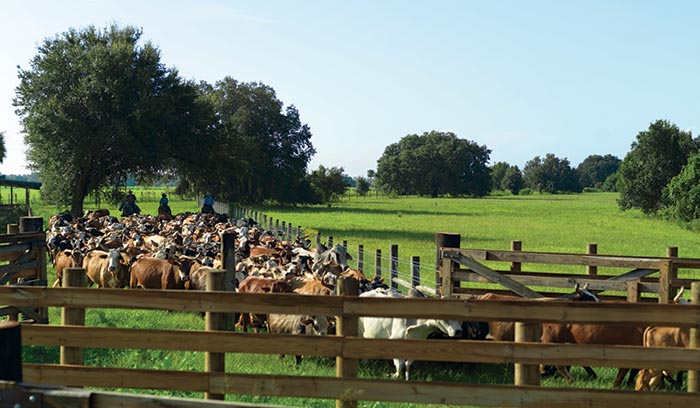
All on her Own
Barbara Carlton rises before the sun each morning, the ranch on her mind. About 25 miles east of the interstate in Sarasota, where rusted gates dot the state road and houses are spread miles throughout, the world is silent, sans the occasional moo of a cow and the hum of a car on its way into the city. Like every day, Barbara, 75, will meet her foreman at 7 a.m. to discuss the day’s tasks: rotating the cows, mending the fences, branding and vaccination cycles.
Barbara is sweet as the day is long, like fresh-cut sugar cane or that first bite of peach pie in July. She’s a quintessential Southern woman: well-mannered and diligent. Meeting her for the first time it’s hard to believe she manages 200 acres of citrus and 17,000 acres of ranchland, making it the largest ranch in Sarasota County. It’s a perception she has fought for the last 20 years, but it’s one she has no problem shooing away, whether it’s in the city or on the ranch.
A strong woman who always has a saccharine smile shining through a fresh application of rose red lipstick, Barbara carries herself like someone who has never complained a day in her life. But it’s not like anyone would blame her if she did.
Her husband, Thomas Mabry Carlton Jr., was killed in a plane crash in 1989 when things went bad during a routine flight over the ranch. More than 20 years later, the woman from Willard, N.C. is keeping her husband’s legacy alive, all while paving the way for the next generation.
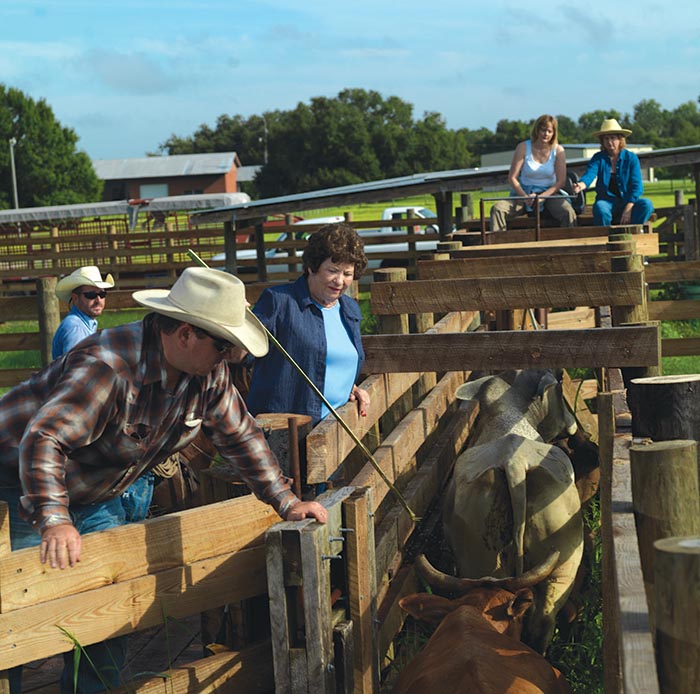
Taking the Reins
Looking back, Barbara says there was never any doubt. Sure, Mabry was the only one who knew just about every piece of the pasture but let someone else come in and run the ranch? Better yet, sell the property for a huge profit? The idea never crossed her mind.
She grew up in the tobacco fields of North Carolina, and truth be told, she never intended on working in any fields ever again. She left for Florida in 1955 to live closer to her sister and earned a spot as head bookkeeper at Wauchula State Bank. It was in Wauchula that she met her cowboy. The two fell in love and got married in 1961, and Barbara moved out to the ranch that year.
Stretching 17,000 acres from Northport to Manatee and Desoto counties, Mabry Carlton Ranch started as a small portion of a 100,000-acre trust owned by Mabry’s great-grandfather. That land was divided between Mabry’s father, Thomas Mabry Carlton Sr., who received 12,000 acres, and his siblings. Mabry and his father added to that piece over the years, expanding to a grand total of 17,000.
Barbara spent nearly 30 years as the ranch’s bookkeeper and took over a good portion of its operations when Mabry ventured into his political career on the Sarasota County Commission. Her experience made her transition to full-time manager after his death less jarring. It wasn’t about whether or not a woman could manage the ranch. It was about keeping the duty within the family.
“I’ve made this statement many times,” she says. “If I lived here for 28 years and I didn’t know what was going on, no one would know what was going on. We live right here. Every morning, I knew what was going on because this was my life. We knew that we certainly wouldn’t turn it over to a manager. Nobody could manage this but us.”
Mabry and Barbara raised two daughters on this substantial chunk of land: Lisa, a former state senator, and Kim, a Sarasota County judge.
Lisa recalls being home one week from law school when her father died. Then a practicing attorney, she moved home after she graduated to live on the ranch and help her mother.
“My mom would be pretty humble with it, but I think if you look at the operation of a cattle ranch after my dad died, you could safely say we continued to run it efficiently,” she said. “We did some things different, but we’ve made tremendous improvements, things he would be proud of.”
Barbara agrees: “I think Mabry would be really happy to know we’ve managed it a little different than him, but we learned how to do it,” she said. “We learned to see how to get it done and made it easier for the next person to come along.”
People always use to tell Mabry, “Why do you raise those girls way out there in the woods?” It was a running joke in town that if the couple let Lisa and Kim ever leave Sidell Road, they’d never see them again.
The sisters proved them all wrong.
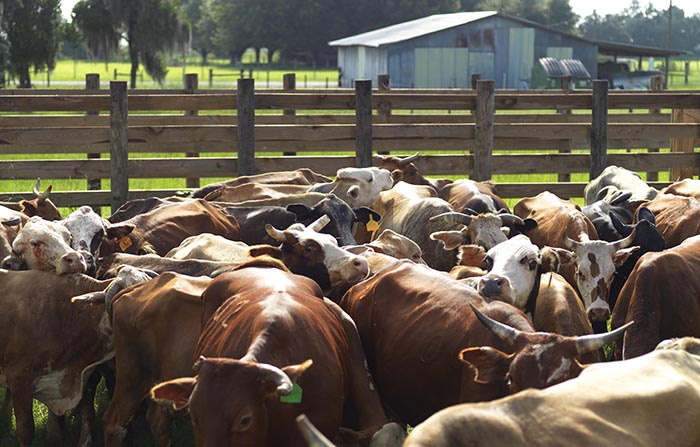
There and back again
When you sit down with Lisa and Kim, hints of a sibling rivalry, innocent as it may be, bubble to the surface. Lisa is the talker. “I’m the employed one,” Kim says with a laugh.
Now retired from politics, Lisa helps mom run the ranch full-time. Reserved and constantly listening, Kim helps Barbara during nights and weekends.
Their father always stressed the importance of education and pushed them to pursue careers outside of the ranch. To Mabry, the betterment of the ranch relied on their ability to learn about the outside world’s perception of cattlemen and to educate them on the importance of preserving that lifestyle.
“What you have in a lot of these families,” Lisa says, “younger generations get further removed from the ranch. That’s where you have a break up of the family-owned operation. The ranch becomes a smaller part of their lives. For us, as a family, we’ve all made a conscious decision that this is not only what we do as a business—this is our life.”
That mentality and persistence helped the Carltons in completing a conservation easement agreement with the Southwest Florida Water Management District. In December 2007, SWFWMD preserved more than 7,200 acres of Mabry Carlton Ranch, ensuring it will never be developed. Barbara was the first private landowner in Sarasota County to successfully negotiate a conservation easement.
Together, Kim and Lisa are an important part of the Carlton family’s legacy. Without their dedication to preserving Florida’s frontier who knows where the ranch would be after Barbara decides to retire.
Both daughters built houses right on the ranch. Some might call it a unique living arrangement, at least compared to today’s standards. Lisa and her husband, Rob, rear their three kids right across the dirt path from mom, and Kim and her husband, Tom, raise their two kids across from them. This triangle of homes is separated by just 300 feet, but somehow it all works.
Lisa says living back on the ranch was an agreement she made with her husband before they got married. In addition to helping her mother maintain the ranch, she felt it was the only way for her children—and Kim’s children—to learn, love and appreciate the ranch. It’s a view that Barbara thinks comes from their father.
“The girls have proved that their father was right,” she says. “Each went on their own. Lisa had a great career in the legislature; Kim is the best judge Sarasota has ever had. He would be extremely proud of them, and that’s exactly what he wanted. They’re here, they’re here.”
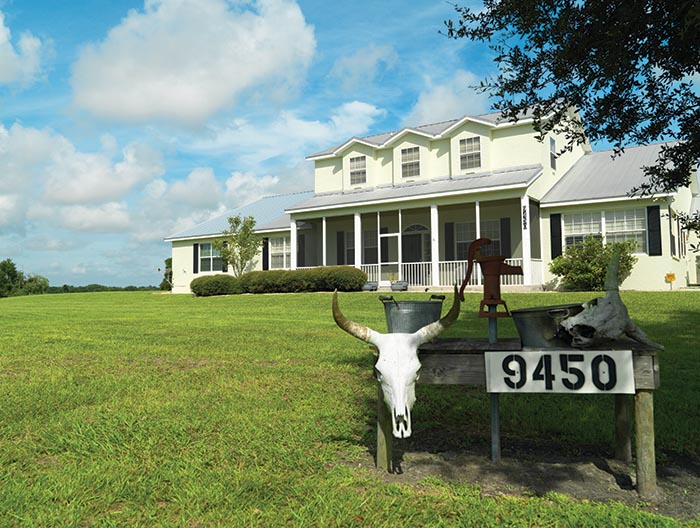
Eyes on the Future
Like the tale of every ranch in Florida, this one ends with a question. Mabry Carlton Ranch is currently in its fourth generation and the family wonders what the future holds for them. Will they want to continue in the agriculture business? Will living on the ranch produce the same appreciation for the lifestyle for the kids that it did for Lisa and Kim?
In Barbara’s mind, a true cattle rancher never sees the property as belonging solely to them. She’s managing it for Lisa and Kim. Lisa says the conservation easements have sealed the ranch from development and that their efforts now must be placed on educating their children on how important Florida’s cattlemen and women really are.
Just like their father did with them, the Carltons are teaching the kids how important an outside education is to the ranch, and how living the ranch lifestyle, rather than seeing it as a business, is the key to its long-term success.
“We want to be sure that (the ranch) is always preserved in perpetuity,” she says. “It didn’t affect us that much because we wanted it to be a cattle ranch and that’s why we’ve already made the decision for our kids and grandkids.”
Whether or not they choose to live the ranching lifestyle has yet to be seen. With four granddaughters and one grandson, the women of Mabry Carlton Ranch might be continuing the trend Mabry set in motion, rearing the next generation of Florida cowgirls.